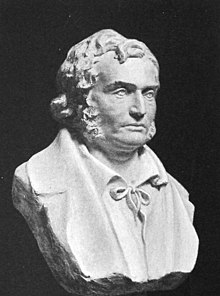Poul Martin Møller
| Poul Martin Møller | |
|---|---|

Bust of Møller by L. Hasselriis
|
|
| Born | 21 March 1794 Uldum near Vejle |
| Died | 13 March 1838 Copenhagen |
| Occupation | Poet, Academic |
| Nationality | Danish |
Poul Martin Møller (21 March 1794 – 13 March 1838) was a Danish academic, writer, and poet. During his lifetime, he gained renown in Denmark for his poetry. After his death, his posthumously published fiction and philosophical writings were well received. He also devoted several decades of study to classical languages and literature. While serving as a professor at the University of Copenhagen, he was a mentor to the philosopher Søren Kierkegaard.
Møller was born near Vejle and raised on the island of Lolland, where his father served as a pastor. As a young man, his father tutored him in classical languages and literature. In 1812 he enrolled in the University of Copenhagen and studied theology. He also taught religion at a nearby school during this time. He graduated as the valedictorian of his class three and a half years later. In 1815 he published his first poem. After a stint as the tutor of two young counts, he returned to Copenhagen to study classical philology. After an unsuccessful proposal of marriage to his childhood sweetheart, he left Copenhagen to serve as the pastor of a ship during its two-year journey to China. While on the journey, he read the complete works of Cicero, wrote poetry, and wrote in his journal. After returning to Copenhagen, he began teaching Greek and writing poetry and fiction. He later successfully proposed to his first wife, with whom he had four sons. From 1826 to 1832, he taught at the Royal Frederick University in Christiania. Although he rose from assistant professor to full professor, he disliked living in Norway and returned to Denmark.
Although eccentric, notoriously disheveled, and prone to becoming distracted during lessons, his good nature and pleasant disposition allowed him to become a popular teacher. In 1831, he was promoted to Professor Extraordinary at the University of Copenhagen, where he taught Hegel, classical literature, and moral philosophy. His first wife died in 1834, an event which left him shaken to the core and almost unable to function. Two years later, he married a friend of his late wife. He fathered a daughter with his second wife before succumbing to what was most likely liver cancer in March 1838.
...
Wikipedia
